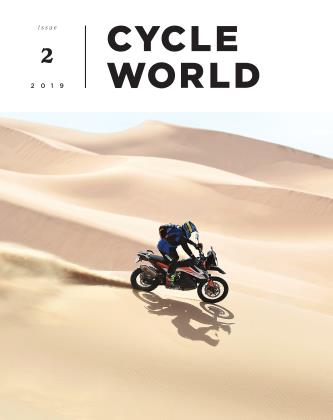MARK BLACKWELL
The LEADER
ANDREW CHERNEY
Mark Blackwell doesn’t want to talk about the past. The honors stretch back some 40 years and his trophy case is filled to the brim, but his primary focus these days is on the future. Namely, the future of motorcycling.
Blackwell was a leading rider and an early star in the first days of U.S. motocross during the late 1960s and early 1970s, starting on Husqvarnas. One of the first American champions, he raced on the Grand Prix circuit in Europe and won the 1971 American 500cc Motocross title.
By 1975, he’d begun to transition to the business side of the industry, transforming Suzuki’s struggling motocross racing operation into one of the most formidable teams of the early 1980s. Blackwell then jumped to Husqvarna and returned its U.S. moto division to profitability. The exclamation point to that chapter of an incredible career came with Blackwell’s induction into the AMA Hall of Fame in 2000. But he then moved to Polaris to lead the Victory brand and continues to consult with major manufacturers.
And while he cherishes all the accomplishments, Blackwell says these days he’s more interested in getting the future of motorcycling to be just as rosy as its yesteryears. The Hall of Famer isn’t trying to bury past glories; it’s just that he’s moved on.
Cycle World: You mentioned coaching initiatives as a way of encouraging new riders to come into our sport.
Mark Blackwell: I’ve been working with Jon-Erik Burleson whom I’ve known since he was a boy. [Jon-Erik is son of AMA motocross, enduro, and ISDT champion Dick Burleson.] We reconnected later when he was the CFO at KTM North America... and I was the head motorcycle guy at Polaris. Jon-Erik and I spent lots of time talking about the future of the sport. We were concerned that the outlook was grim, [and we said] we gotta do something.
“We were concerned that the outlook was grim, [and we said] we gotta do something.”
CW: And this was post-recession?
MB: Yes. After the financial crisis, everybody expected the motorcycle market to rebound. In 2012, other industries were rebounding, and we weren’t; so we think, “Are there other sports that have done well that we compare to more closely?” And that was skiing and bicycling.
I called up my friend Scott Boyer [from] the ski industry and said, Scott, the ski industry seems to be doing better; do you know anything about that? He says, “Yeah, the guy I went to college with, Dr. Steve Johnson, started the coaching program for USSA [the U.S. Ski & Snowboard Association], Do you want an introduction?” I said, “Are you kidding me?! Yes!”
Dr. Johnson tells me, “Mark, I don’t have research saying why this works but we’ve been doing this for 25 years and every time we do good coaching, we see new people come into the sport; and if we keep doing it, they stay.”
They created a system to certify coaches, background check them, put them through training. It’s nationwide. So we thought, what if we did that for motorcycling?
Dr. Johnson did the same program at USA Cycling, so we met there with people from Honda, Kawasaki...from across the industry. We said, “Guys our age who drove the growth of the sport in the ’60s and ’70s are leaving, and there’s only one new person coming in for every three that exit— we have to stop the losses. We think coaching is the key.”
We also surveyed people who expressed interest in motorcycling.
We asked, “What are your concerns?” And naturally it was safety.
So we talked about coaching and they were like, “You mean there are people who can help me learn to ride a motorcycle safely?” Think about it... there are like 9,000 MSF coaches in the country, but nobody knows that! I’m just saying the industry actually has resources. We put all these people through rider-education programs, yet only [about] 15 percent actually become motorcyclists.
CW: So you’re saying we tweak the rider-education structure to retain them.
MB: [After the USA Cycling meeting] Jeff Emig joined Jon-Erik and I and said let’s start this U.S. Motorcycle Coaching Association. We went around the country asking coaches what they wanted and turned that into an online training program (USMCA. org). We’re trying to create a platform of certified coaches and connect them with riders, then educate dealers. We’ve hit 100 certified coaches and want to have 500 by 2020. We want to bring 250,000 new and returning riders to the sport by 2025. And we’re making it clear that this is a nonprofit, volunteer effort.
“We put all these people through ridereducation programs, yet only 15 percent actually become motorcyclists. ”
CW: Any interest in going back to the racing environment?
MB: I still love racing as much as anything, but at this stage I just want to do new things. To sum up: I love my past—but I think I could add 100 times more value by giving back to the sport.
 View Full Issue
View Full Issue
More From This Issue
-

Devolution
Issue 2 2019 By Sam Smith -
 Feature
FeatureEchoes of Dakar
Issue 2 2019 By Justin Dawes -
 TDC
TDCWhen the Engine Starts
Issue 2 2019 By Kevin Cameron -
 Reviews
ReviewsBalance of Power
Issue 2 2019 By Michael Gilbert -
 Elements
ElementsFrom the Foundry
Issue 2 2019 By Kevin Cameron -
 Reviews
ReviewsFlat Cool Track Bred
Issue 2 2019 By Mark Hoyer







